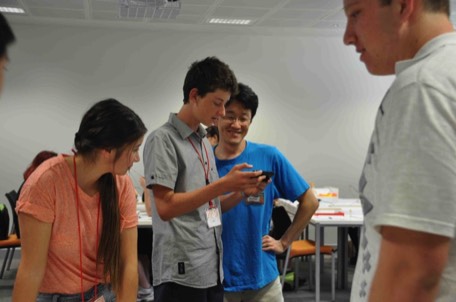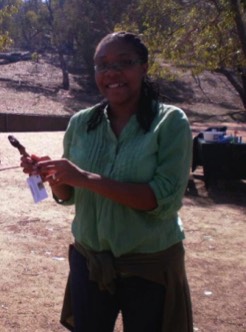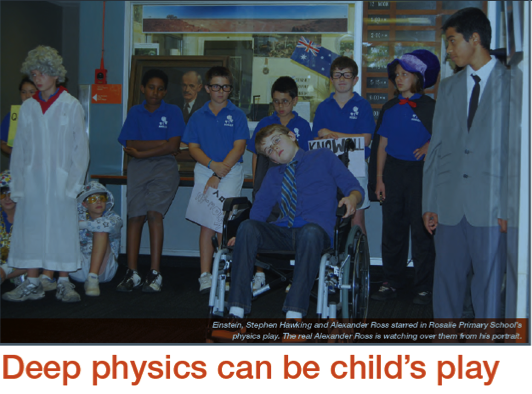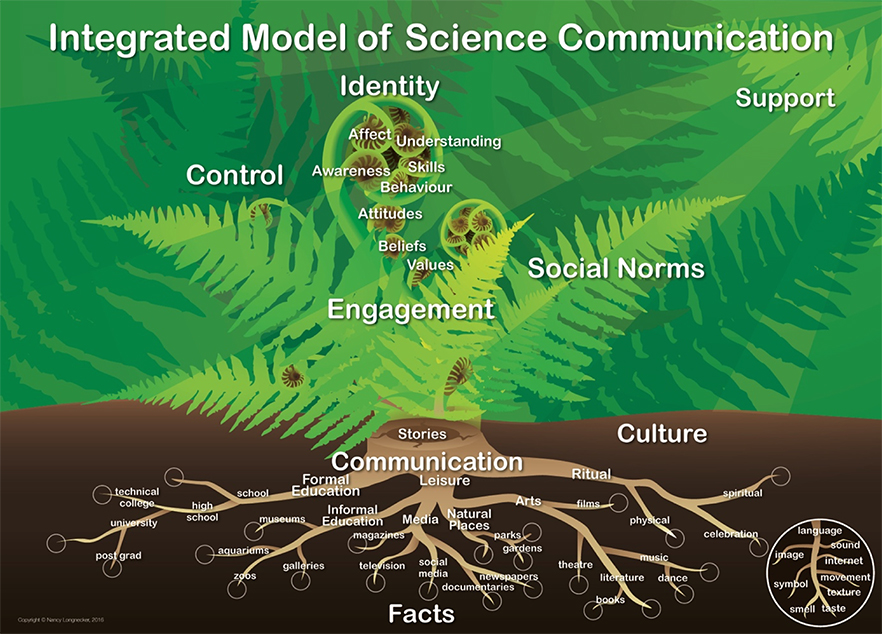Motivations to Participate in Science and Impact of Science Engagement
The main aim of much of Nancy's research involves improving understanding of factors that make science engagement activities and resources more effective. Her research group examines motivations and barriers to participation in science and whether participation in citizen science and other science engagement activities changes attitudes, understanding and behaviours. She also examines motivations to studying science and becoming professional scientists.
Selected references:
Solis, D., Hutchinson, D. & Longnecker, N. (2021). Formal learning in informal settings – increased physics content knowledge after a science centre visit. Frontiers in Education; Special Issue ¬– Learning Science in Out-of-Classroom Settings. 6: 698691, 1-12. doi: 10.3389/feduc.2021.698691.
Hanisch, E., Johnston, R. & Longnecker, N. (2019). Cameras for Conservation: Wildlife Photography, Emotion al Attachment to Nature, and Engagement with Biodiversity. Human Dimensions of Wildlife. 24 (3). DOI: 10.1080/10871209.2019.1600206.
Liberatore, A., Bowkett, E., MacLeod, C., Spurr, E. and Longnecker, N. (2018). Social Media as a Platform for a Citizen Science Community of Practice. Citizen Science: Theory and Practice. 3(1): 3, pp. 1-14. DOI: 10.5334/cstp.108.
Longnecker, N., Elliott, J., Gondwe, M. (2014). Inspiring Australia: An Evaluation Tool for Science Engagement Activities. Perth, WA.
Fletcher, J., Salter, Z. & Longnecker, N. (2014). Not just a load of rubbish: A marine debris citizen program's impact on school teachers. Public Communication of Science and Technology. Salvado, 7 Brazil, March, 2014.
Venville, G., Rennie, L., Hanbury, C., & Longnecker, N. (2013). Scientists reflect on why they chose to study science. Research in Science Education. 43: 2207- 2233. DOI 10.1007/s11165-013-9352-3.
Bickford, S., Longnecker, N, & Venville, G. (2011). Student and Teacher Feedback on a Science Careers Outreach Program: An 'Alignment' Perspective. National Association for Research in Science Teaching (NARST), Orlando, FL.
Venville, Grady, Mary Oliver, Nancy Longnecker and Léonie Rennie. (2010). Selecting Science Subjects: Why Students Do, Why They Can't! Teaching Science. 56(3):19- 26.

Different Perspectives and Ways of Knowing

Good science communication respects people's values and different sources of knowledge. Research in Nancy's group examines various perspectives, perceptions of knowledge and valuing of different knowledge sources.
Selected references:
Fletcher J, Higham J, Longnecker N (2021) Climate change risk perception in the USA and alignment with sustainable travel behaviours. PLoS ONE. 16(2): e0244545, 1-17. https://doi.org/ 10.1371/journal.pone.0244545.
Fleming, J.S., Longnecker, N., Salmon, R.A. & Hikuroa, D.C.H. (2020). Moving to participatory science and bicultural science communication in Aoteoroa New Zealand. (In: Toss Gascoigne (editor), The emergence of modern science communication, ANU Press). http://press-files.anu.edu.au/downloads/press/n6484/pdf/ch04.pdf (PDF)
Manyweathers, J., Taylor, M. & Longnecker, N. (2020). Expertise and communicating about infectious disease: A case study of uncertainty and rejection of local knowledge in discourse of experts and decision makers. Journal of Science Communication. 19(04). A01: 1-10. doi.org/10.22323/2.19040201.
Fletcher, J., Longnecker, N. & Higham, J. (2019). Envisioning future travel: Moving from high to low carbon. Futures.109: 63-72. https://doi.org/10.1016/j.futures.2019.04.004.
Javiera Cisternas, Ngāti Peehi, Ngāti Te Kanawa, Te Haukainga o Pureora, Jennifer Germano, Priscilla Wehi, Phillip J. Bishop, Nancy Longnecker. (2019). 'Get together, work together, write together': a bicultural framework for conservation of New Zealand frogs. New Zealand Journal of Ecology. 43(3): 1-10. https://www.jstor.org/stable/10.2307/26841835.
Longnecker, N. & Scott, C. (2018). Challenges of cross-cultural communication in production of a collaborative exhibition: Wai ora, Mauri ora. Journal of Science Communication 17 (4), doi.org/10.22323/2.17040305.
Manyweathers, J. J., Field, H., Longnecker, N., Agho, K. , Smith, C., Taylor, M. (2017). Why won't they vaccinate? Risk perception and uptake by horse owners of the Hendra virus vaccine for horses. BMC Vet Research. 13 (1): 103.
Manyweathers, J. J. , Field, H., Jordan, D., Longnecker, N., Agho, K., Smith, C., Taylor, M. (2017). Risk mitigation for emerging zoonoses: Hendra virus and 13 non-vaccinating horse owners. Transboundary and Emerging Diseases. 64 (6), 1898-1911.
Gondwe, M. & Longnecker, N. (2015). Objects as stimulus for elucidating assumptions of cultural and scientific knowledge. Science, Technology and Human Values; 1-27. DOI: 10.1177/0162243915577452.
Gondwe, M. & Longnecker, N. (2014) Scientific and cultural knowledge in intercultural science education: student perceptions of common ground. Research in Science Education. DOI: 10.1007/s11165-014-9416-z.
Abecasis, R., N. Longnecker, L. Schmidt and J. Clifton. (2013). Implications of community and stakeholder perceptions of the marine environment and its conservation for MPA management in a small Azorean island. Ocean and Coastal Management; 84: 208- 219.
The Value of Stories and Storytelling
Effectiveness of storytelling in communicating science includes examining the impact of poetry, text-based stories and podcasts on audience attitudes about science and scientists.
Selected references:
Longnecker, N., Pegrum, M., & Bartle, E. (forthcoming). Creative Podcasting to Develop Content Knowledge and Communication Skills. In: Rowland, S. & Kuchel, L. (eds): Science + SciComm + Work: Effective Communication in Science Programs. A Practical Guide for Students and Teachers. Springer.
Pegrum, M., N. Longnecker and E. Bartle. (2014) Can Creative Podcasting Promote Deep Learning? British Journal of Educational Technology. doi:10.1111/bjet.12133.
Ishigami, K. Gondwe, M. Williams & Longnecker, N. (2014). Learning science by reading stories. Proceedings of conference of Australian Science Communicators. 3-5 Feb, 2014. Brisbane, Qld.
Gondwe, M. & Longnecker, N. (2013). Student generated films about science and culture; a cross-cultural case study of Malawian and Australian schools. African Studies Association of Australasia and the Pacific. Murdoch University. Perth, Nov, 2013.

Science Communication and its Education
Nancy has an understanding of the scholarly discipline of science communication, experience as a professional science communicator as well as comprehensive teaching experience. She uses her experience to conduct research aimed at advancing the discipline and improving the teaching and learning of science communication in higher education.
Selected references:
Longnecker, N. (forthcoming). Good Science Communication Considers the Audience. In: Rowland, S. & Kuchel, L. (eds): Science + SciComm + Work: Effective Communication in Science Programs. A Practical Guide for Students and Teachers. Springer.
Mitchell, N., Triska, M.; Liberatore, A.; Ashcroft, L.; Weatherill, R.; Longnecker, N. (2017) Benefits and challenges of incorporating citizen science into university education. PLOS ONE. 12 (11): e0186285 DOI: 10.1371/journal.pone.0186285.
Longnecker, N. (2016). An integrated model of science communication – More than providing evidence. Journal of Science Communication. 15(05). 1-13.
https://doi.org/10.22323/2.15050401.
Longnecker, N. and M. Gondwe. (2014). Graduate degree programmes in science communication: Educating and training science communicators to work with communities In: Communicating Science to the Public: Opportunities and Challenges for the Asia-Pacific Region (Ed: Hin, L.T.W. & Subramaniam, R.). DOI 10.1007/978-94-017-9097-0_9, Springer.
Sullivan, M. & N. Longnecker. (2014). Creating a Community of Learners: Class Blogs as a Teaching Tool to Promote Writing and Student Interaction. Australasian Journal for Education Technology. (30)4: 390- 401.
Rifkin, W., Longnecker, N., Leach, J., & Davis, L. (2012). Assigning students to publish on the web: Examples, hurdles, and needs. Journal of the NUS Teaching Academy, 2 (2), 79-94.
Bartle, E., N. Longnecker and M. Pegrum (2011). Collaboration, Contextualisation and Communication Using New Media: Introducing Podcasting into an Undergraduate Chemistry Class. International Journal of Innovation in Science and Mathematics Education. 19(1):16-28.
H.A.J. Mulder, N. Longnecker and L.S. Davis. (2008). The State of Science Communication Programs at Universities around the World. Science Communication. 30(2): 277-287.

